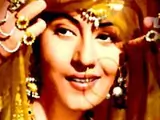Songs From Meena Kumari films
https://www.youtube.com/watch?v=HkLz7Q-4ssQ
Meena Kumari (August 1, 1932 – March 31, 1972) was an Indian actress known as "The Tragedy Queen"
Childhood
She was born as Mahjabeen Bano in what was then Dr. Gadre's Clinic in Bombay as the third daughter in a row. She was the youngest amongst Khursheed, Madhu, and Mahjabeen-the name given to her. Because the family was so poor, there was no money to give the doctor. Ali Bux, her father, almost left her at a Muslim orphanage, but picked her up after a few hours. Bux was upset that his wife had given birth to another daughter.
Family
Her father, Ali Bux, variously identified as a Sunni Muslim or a Parsi, was already a dabbler in cinema. A veteran of Parsi theater, he used to play the harmonium, wrote Urdu poetry and was a music teacher. He had played small roles in films like Id Ka Chand and had composed music for small films like Shahi Lutere. Her mother, Prabhawati Devi, was apparently the second wife of Ali Bux. One tradition connects her to the Tagore family. Meena Kumari's grandmother, Hem Sundari Thakur (Tagore) was married into the Tagore family but after her husband, Rev Bill's death, she was compelled to give up the use of the family name by the powerful Tagore clan. Her daughter, Prabhawati Devi was a stage actress and dancer with the stage name Kamini before meeting Ali Bux. After their marriage, Prabhawati converted to Islam and changed her name to Iqbal Begum.
Career
When Mahjabeen was born, Ali Bux had hit upon hard times and was living near Rooptara Studios, where he had hopes of getting a role as an actor. Her therefore mastered his disinclination and, urged on by his wife, tried to get his daughter into films, despite her protestations of wanting to go to school. Young Mahjabeen is remembered to have said I don't want to work in films. I want to go to school and learn like other children. Meena had a love-hate relationship with films till her death.
Early work
Mahjabeen was renamed Baby Meena and her first film as a child was Farzand-e-Watan or Leatherface (1939), directed by Vijay Bhatt for Prakash Studios. She was the sole bread-earner of the family as she was given roles in films all throughout the 1940s. Her early adult work consisted of mainly mythological films like Veer Ghatotkach (1949), Shri Ganesh Mahima (1950) and fantasies like Alladin and The Wonderful Lamp (1952).
Breakthrough
Meena hit the big time with her mentor Vijay Bhatt's Baiju Bawra (1952). With Baiju Bawra, the suffering Indian woman found a new face in Meena Kumari (for the film she adopted the name Meena Kumari). The heroine in the film is ever ready to negate herself for the material and spiritual advancement of the man she loves and is even willing to annihilate herself to provide him the experience of pain so that his music would be enriched. Her performance fetched her the inaugural Filmfare Best Actress Award in 1953.
With Parineeta (1953), Daera (1953), Ek Hi Raasta (1956), Sharda (1957) and Dil Apna Aur Preet Parayi (1960), Meena went from strength to strength playing the suffering woman, the martyr to prefection. It is a pity that Meena was known for her tragic roles and she too chose more such roles to cultivate her image of being the great tragidienne because in the few light-hearted films she did in-between like Azaad (1955), Miss Mary (1957), Shararat (1959), and Kohinoor (1960) she displayed an unhibitedness that was refreshing to say at least.
However, it was tragedy that saw Meena Kumari's greatest performance and immortalized her. The film was Sahib Bibi Aur Ghulam (1962), produced by Guru Dutt. The sequence where Choti Bahu dresses for her husband singing is a poignant exploration of a woman's expectations and sexual desire. But Meena was on the road to gradual ruin. She began drinking heavily (like her character Choti Bahu) to a point of no return, but carried on. That year, Meena Kumari made history as she garnered all three Best Actress nominations for the Filmfare Award- for Aarti (1962), Main Chup Rahoongi (1962), and of course Sahib Bibi Aur Ghulam (1962)- for which she won the award. However, the common factors between the actress's life and Choti Bahu are too dramatic to be merely coincidental - the estranged marital relationship, the taking of alcohol, younger male company, the craving to be understood and loved by all, are elements in Meena Kumari's own life. Elements which were mythicized in the film world in the 1960s.
Later work
While on the professional front, the emphatic success of Dil Ek Mandir (1963), Kajal (1965), and Phool Aur Pathar (1966) kept her a top star. Meena increasingly relied on the intimate kindness of younger men like Dharmendra and often dulled her senses with liquor. Her image grew in dimension as she was now widely seen as an eternal martyr. Meena spent the last years of her life playing the doomed diva. With heavy drinking she had lost her looks and she began playing character roles in potboilers like Jawab (1970) and Dushman (1971). A talented poetess in her own right, she recorded a disc of her Urdu poems - I write, I recite.
She came up with a strong portrayal of and old woman caught between two street gangs of frustrated, unemployed youth, whose killing finally makes them realise the futility of violence in Gulzar's directorial debut Mere Apne (1971) and realised she had a limited time left and went out of her way to complete what has now become a cult classic - Pakeezah (1972). Pakeezah finally released in February, 1972 and opened to a lukewarm response. However after Meena Kumari's death a month after the film's release, it became a hit.
Death
On March 31, 1972, Meena Kumari was extremely sick and had to be admitted to hospital where she was on oxygen for four hours. She left bits and pieces of Urdu poetry for Gulzar. She died of cirrhosis of the liver at 3:25 p.m. and alcohol was not required anymore. Meena Kumari's last film was Gomti Ke Kinare (1972). Tanha Chand, a collection of her Urdu poems under the pseudonym Naaz was compiled by Gulzar and published after her death. Pakeezah became a box-office superhit after her death and she has since acquired the legendary status and Pakeezah is regarded as her best film.













 eena Kumari, whose name in India has now become synonymous with the tragic heroine, shot into stardom in the early fifties with the release of Baiju Bawra (1952). The daughter of a Parsee theatre actor, Mahajabeen acted in her first film at the age of six. She took on the name Meena Kumari for Vijay Bhatt's immensely popular musical Baiju Bawra. Her early films were rather unremarkable mythologicals.Meena Kumari entered the limelight at a time when histrionics were taking over from glamour (as epitomized by such beauties as Naseem, Veena, Sofia and Jayshree). She therefore heralded a new era of actresses that included Nargis, Nimmi, Suchitra Sen and Nutan.By 1953, Meena Kumari had starred in three other commercially successful films: Daera, Do Bigha Zameen and Parineeta. Parineeta became a turning point in her career. Her evocative portrayal of the perennially suffering Indian woman struck a responsive chord in millions of women. She was never really able to shake off this image of a tragidienne, and at times this severely impeded her in the exercise of the full range of her histrionic talents. The following years saw her appear in a number of films, where she played many, largely indistinguishable, self-mortifying women.
eena Kumari, whose name in India has now become synonymous with the tragic heroine, shot into stardom in the early fifties with the release of Baiju Bawra (1952). The daughter of a Parsee theatre actor, Mahajabeen acted in her first film at the age of six. She took on the name Meena Kumari for Vijay Bhatt's immensely popular musical Baiju Bawra. Her early films were rather unremarkable mythologicals.Meena Kumari entered the limelight at a time when histrionics were taking over from glamour (as epitomized by such beauties as Naseem, Veena, Sofia and Jayshree). She therefore heralded a new era of actresses that included Nargis, Nimmi, Suchitra Sen and Nutan.By 1953, Meena Kumari had starred in three other commercially successful films: Daera, Do Bigha Zameen and Parineeta. Parineeta became a turning point in her career. Her evocative portrayal of the perennially suffering Indian woman struck a responsive chord in millions of women. She was never really able to shake off this image of a tragidienne, and at times this severely impeded her in the exercise of the full range of her histrionic talents. The following years saw her appear in a number of films, where she played many, largely indistinguishable, self-mortifying women.














